Beyond The Binary
Reporter Daelen Ratterman discusses the usage of they/them pronouns and the stigma surrounding them.
Photos by Erica Fields
Adeline Akayezu, 17, and Daelen Ratterman, 16, discuss their views and experiences on pronouns.
“They/them. Those are my pronouns. That’s who I am.”
This statement elicits emotions like confusion, anger, and annoyance for many of us, like my mom. I’m genderfluid and I go by they/them pronouns. I came out to my mom this past summer. She happily accepted me, but she also expressed her confusion.
“‘They’ is plural. I can’t call you a plural pronoun. It doesn’t make sense to me,” she said.
They/them pronouns are somewhat of a new concept, so it’s okay to be confused. But it’s also okay to learn about them. Why do people go by they/them pronouns? Are these pronouns grammatically correct? What does it mean to be genderfluid or nonbinary?
‘Nonbinary’ refers to someone who is neither a girl or a boy. It is a specific gender identity, but it is also an umbrella term for anyone who identifies outside of the gender binary (man and woman). Nonbinary people often go by they/them pronouns because those aren’t gendered, like ‘she’ and ‘he.’
Gender nonconforming is also an umbrella term; it refers to someone whose behavior or appearance does not follow the social expectations of their assigned gender at birth. Nonbinary people, as well as genderfluid people, are gender nonconforming.
Now what does ‘genderfluid’ mean? I like to explain being genderfluid as ‘flowing’ between genders. The gender of a genderfluid person is not fixed and it can change day-to-day or over time. One day, a genderfluid person could feel like a boy, and the next day they could feel like a girl. They could feel like every gender or no gender at all. There are a multitude of reasons a person may choose to go by they/them pronouns, so it’s important we understand them.
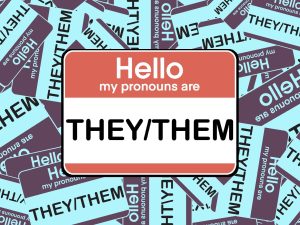
Language is not static. It changes over time, adhering to the needs of its speakers. There are many different reasons for language change, one of them being new technology or inventions. If language was non-changing, thenwe wouldn’t have words for things we use in our daily lives, like the television. The word ‘television’ was not present in the English language until the 1950s when the invention became available. People adapted and created a new word for this object in order to communicate.
Teenagers also contribute to language change. New generations tend to make up, shorten, or combine words to communicate with their peers in a different way than adults. Some words like this have been so commonly used that they have become a part of our standard language. Some examples of this are ‘vacay’ and ‘hangry.’ Both of these words are in the dictionary. ‘Vacay’ is the shortened version of vacation and ‘hangry’ is the combination of ‘hungry’ and ‘angry.’ The generation of young adults and teenagers today is a big part of they/them pronouns’ relevance. As new generations emerge, acceptance for people in the LGBTQ+ community increases.
Using they/them pronouns to refer to gender nonconforming people is a fairly new thing in our society, but using the singular they is not. We can trace the usage of the singular they back to 1375 in “William and The Werewolf.” In this book by a poet named William, the singular they is used to refer to unnamed people: “No one dared spy on him, but they let him do as he pleased.” ‘No one’ is singular, but the author uses ‘they’ to replace it in the second clause of the sentence. In Lorraine Berry’s “They: The Singular Pronoun That Could Solve Sexism in English, she illustrates that in Jane Austen’s 1813 book, “Pride and Prejudice,” Austen uses the singular they 75 times in order to refer to a genderless antecedent, like “everyone.”
Our hesitancy to use the singular they began in the eighteenth century when grammarians insisted that a plural pronoun could not be used to replace a singular antecedent. These grammarians failed to consider the singular you though. In older dialects of English, the pronoun ‘you’ had two versions: ‘thou’ as a singular and ‘you’ as a plural. Certain people deemed anyone who used the singular you as foolish. Teachers reprimanded their students for using it, even though both parties would use the singular you outside of school in casual conversation. Just like the singular they, the singular you became a part of ‘proper’ English because it was so commonly used; ‘thou’ became outdated.
In a 2021 survey, Pew Research Center found that 26% of Americans know someone who uses gender neutral pronouns, which is eight percent up from 2018. The prevalence of they/them pronouns is rising. In 2019, Merriam-Webster named ‘they’ as its word of the year. That year, according to Merriam-Webster, there was a 313% increase in lookups of ‘they.’ Merriam-Webster also added ‘they’ to its dictionary as a nonbinary pronoun. Merriam-Webster is not the only professional entity to acknowledge the singular they as grammatically correct. In 2017, the ‘Associated Press Stylebook’ was updated to include singular they/them pronouns. Also in 2017, the edition of ‘The Chicago Manual of Style’ was updated to allow the usage of the singular they. APA Style took it a step further, clarifying the fact that we must always use a person’s preferred pronouns. MLA Style takes it one more step further by also clarifying the use of preferred pronouns and stating to always use “they” as a generic third person pronoun instead of using “(s)he” or “s/he.”
How does one refer to someone who goes by they/them pronouns? It’s very easy, it just takes some getting used to. Here’s an example with subject pronouns.
“He loves to play basketball.”
“They love to play basketball.”
They’re the same words you would use if you were talking about a group of people, but now you’re just referring to one person. Let’s see an example with object pronouns, now.
“I gave her a pencil.”
“I gave them a pencil.”
Lastly, let’s see an example with possessive pronouns.
“She painted that by herself.”
“They painted that by themself.”
Here, it’s also the same thing, just replacing ‘herself’ with ‘themself.’ But is ‘themself’ a word? Is it grammatically correct? Well it is now, according to Merriam-Webster. However, both “themself” and “themselves” are recognized as grammatically correct to refer to a singular person, so use whichever pronoun is more comfortable.
Why should one care about how to use they/them pronouns if one doesn’t use them? Because caring about people in your community is important. A friend could be nonbinary or some other gender nonconforming identity, but they just haven’t come out yet.
Adeline Akayezu, a 17-year-old who attends Eastern High School, identifies as nonbinary and uses they/them pronouns. Akayezu’s struggle with their gender identity started when they were a child. They were a tomboy, they spent their time with their brother’s friends, and they only hung out around boys. Akayezu didn’t feel like a boy though. But they didn’t feel like a girl either.
They continued to question their gender as they got older. One thing stuck in Akayezu’s mind: their breasts. They hated them; they wanted to just chop them off. They wore three layers of clothing for a while in order to hide them. At first, they thought it was because their breasts were too big, but they gradually realized that it was because they felt like they were being restricted into society’s tight box of gender expectations.
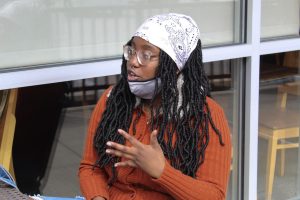
“I’ve realized that it doesn’t matter whether I have breasts or not because I want to be perceived in every possible way someone could be perceived, whether thats as a boy, girl, or non-binary person,” Akayezu said.
Even though Akayezu feels strongly about their gender nonconformity, they still struggle with their gender identity. They use the label “nonbinary” because it’s closest to what they feel, but they’re still not sure if that label completely fits them. Akayezu currently has “they/she/he” listed as the pronouns in their Instagram bio due to their uncertainty. Akayezu feels like there’s something holding them back from just using they/them pronouns. They haven’t “officially” come out to anyone; the only confirmation of their gender is the pronouns in their Instagram bio, and now this article. They are okay with sharing what their gender identity means to them now in hopes of educating others and inspiring a more open-minded dialogue in our communities.
“The world isn’t very accepting,” Adeline says.
Akayezu has dealt with many ‘internet trolls.’ They believe these are easier to deal with than real life bigots, though.
“If I just ignore them, then they can’t get to me.”
Although Akayezu has experienced some discouragement, they have also been met with plenty of acceptance. In their junior year, they were in a physics class, and their teacher sent out a Google form asking for each student’s pronouns. Akayezu was astonished; none of their teachers had ever done this before. They felt tears start to form in their eye.
“I didn’t think it was that serious of a thing, but seeing something like that, it was nice to know that there was at least a little bit of support from people that I don’t know,” Akayezu said.
I’ve experienced this feeling, just like Akayezu. I came out as genderfluid in June of this year. On the first day of school, nearly every one one of my teachers asked students for their preferred pronouns. I felt seen. I felt normal. It brought me back to earth. I remembered that I’m not weird or crazy because of my gender identity. I’m just me, and that’s okay.
I began questioning my gender when I was about 11 years old. I remember seeing a mini-documentary on Instagram about a genderqueer person. It felt so foreign; I had never seen anything like it before. All I knew was girl and boy, and I thought those were the only options. The person in the video expressed their gender identity in a very creative way. They dressed differently every day. One day, they wore a pink cowboy hat, a blonde wig, and a full face of makeup. The next day, they wore a suit and tie. In the video, the person mentioned that they thought gender would eventually become obsolete.
One main idea prevailed: Gender is a spectrum. There aren’t just girls and boys. There’s plenty of other genders, and any of them can fit the way you feel. After watching that video, I was intrigued. I questioned my gender, but I decided to bury those feelings. Throughout middle school, I felt trapped in my femininity. I tried so hard to dress like the other girls in my grade. But deep down, I wasn’t comfortable in those. In high school, I’ve learned to embrace all ends of the gender spectrum. Now, I appreciate my femininity, masculinity, and androgyny. My gender is all over the place; that’s why I feel like genderfluid fits me as a label. My gender is not fixed. The way I feel changes everyday, and I choose to express that through my clothes, hair, makeup, and more.
Since the beginning of the school year, I’ve been met with a great amount of acceptance regarding my gender identity. Many of my friends in my classes refer to me with they/them pronouns, and it makes me so happy. Even my new counselor used my preferred pronouns. At first, she referred to me as “she.” Then, she asked me for my preferred pronouns and corrected herself when I responded. No hesitation, no pushback. I was happily surprised.
But just like for Akayezu, the other side isn’t all sunshine and rainbows. Although most of my classmates are very accepting, there are some that aren’t.
After a long second day of school, I was standing in the hallway to the gym, waiting for my friends. A group of girls was standing next to me.
“All my teachers were asking everyone for their pronouns today,” I heard one of them say.
“Yeah, same,” another girl muttered. This was when I started paying more attention to their conversation.
“It’s so annoying,” the first girl said, rolling her eyes. “Like, how am I supposed to remember that? I’m just gonna call you by your name.”
I sighed. Those girls weren’t talking to me; they weren’t trying to hurt me. But what I heard from their conversation was disheartening. I was so excited for this school year. I saw so many people from my school who were newly identifying with they/them pronouns, just like me. I was excited to feel community, to go back to somewhere where I belong. But those girls brought me back to reality.
Not everyone will welcome an unfamiliar identity with open arms. We’re all brought up differently, and we all come from different environments. And that’s okay. We just need to be open to different perspectives. I need to understand that not everyone can comprehend they/them pronouns, so they might choose to hate the concept instead of embracing it.
There’s a middle ground though, and that’s something we can all aim for. We just need to try to understand. When someone has a different opinion from you, don’t hate them. Ask questions. Learn. Maybe your perspective will change; maybe it won’t. But now you have information from all sides to justify your opinion.
Donations are collected through The Publishers, duPont Manual High School's booster club for J&C. On The Record relies completely on sponsorships, advertisements, and donations to produce and distribute each issue. Please consider donating to our cause, and helping the student journalists of OTR amplify youth voices for years to come.
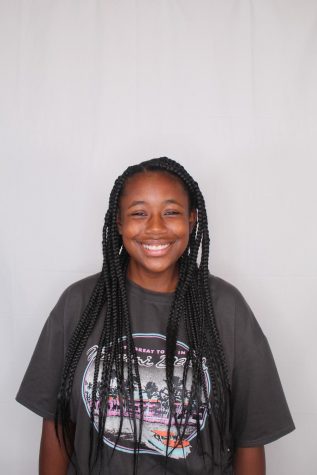
Erica Fields is senior Photo Editor for On the Record. She has a passion for telling comprehensive and compelling stories through photography and dreams...




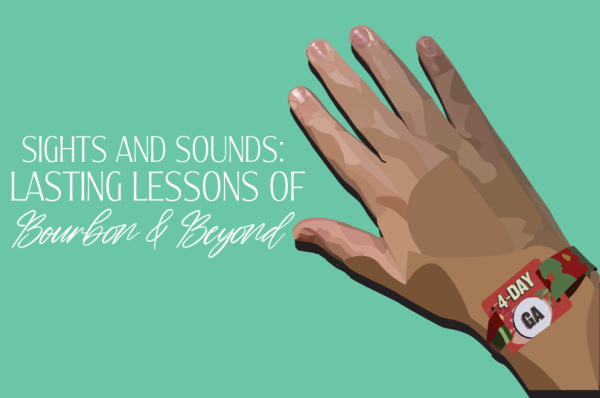


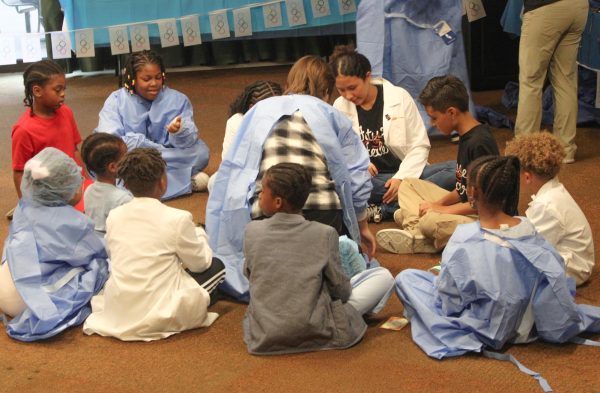

Ratterman Maureen • Dec 7, 2021 at 7:01 pm
Excellent article by an incredible human being!!!
mia leon • Dec 3, 2021 at 1:30 pm
absolutely love the closing!! daelen you are so amazing.
Mattie Townson • Dec 3, 2021 at 1:20 pm
Love how you explored the evolution of language! Great job guys!